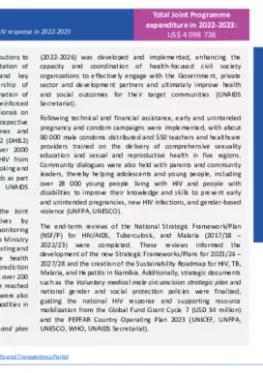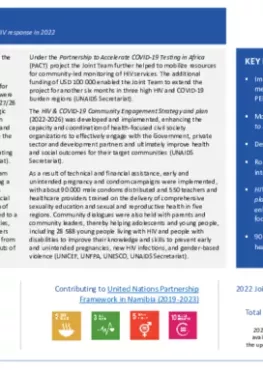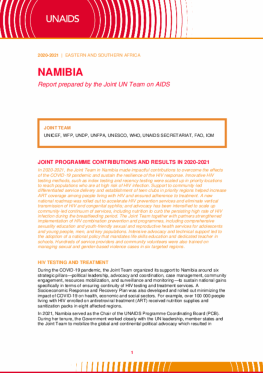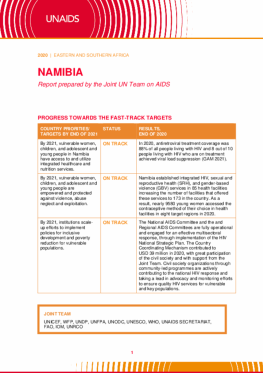|
Namibia
The Joint Programme continued to make impactful contributions to the HIV response in Namibia in ensuring implementation of evidence-based HIV programmes for vulnerable and key populations through active participation and leadership of communities. Namibia’s progress towards triple elimination of vertical transmission of HIV, syphilis and hepatitis B was reinforced not only through the training of 150 healthcare professionals on data collection, analysis and reporting but also retrospective national vertical transmission data validation, reviews and verification in the District Health Information Software 2 (DHIS2) (WHO, UNICEF, UNAIDS Secretariat). Furthermore, over 2000 pregnant women and lactating mothers living with HIV from vulnerable households received education on nutrition, cooking and agriculture improving their health outcomes and livelihoods as part of the 1,000 Days of Nutrition Campaign (WFP, UNAIDS Secretariat).
In partnership with the Global Fund and PEPFAR, the Joint Programme strengthened community-based initiatives by supporting implementation of a community-led monitoring mechanism (CLM). This included technical assistance to the Ministry of Health and Social Services to finalize a multi-year forecasting and quantification of HIV and sexual and reproductive health commodities, including condoms which led to a better prediction and timely procurement of these commodities. As a result, over 200 healthcare providers and more than 5900 individuals were reached in 2022 and 2023. Key findings from the CLM mechanism were also used to avert potential stockouts of medicines and commodities in health facilities (UNFPA, UNAIDS Secretariat).
The HIV & COVID-19 Community Engagement Strategy and plan (2022-2026) was developed and implemented, enhancing the capacity and coordination of health-focused civil society organizations to effectively engage with the Government, private sector and development partners and ultimately improve health and social outcomes for their target communities (UNAIDS Secretariat).
Following technical and financial assistance, early and unintended pregnancy and condom campaigns were implemented, with about 90 000 male condoms distributed and 550 teachers and healthcare providers trained on the delivery of comprehensive sexuality education and sexual and reproductive health in five regions. Community dialogues were also held with parents and community leaders, thereby helping adolescents and young people, including over 28 000 young people living with HIV and people with disabilities to improve their knowledge and skills to prevent early and unintended pregnancies, new HIV infections, and gender-based violence (UNFPA, UNESCO).
The end-term reviews of the National Strategic Framework/Plan (NSF/P) for HIV/AIDS, Tuberculosis, and Malaria (2017/18 – 2022/23) were completed. These reviews informed the development of the new Strategic Frameworks/Plans for 2023/24 – 2027/28 and the creation of the Sustainability Roadmap for HIV, TB, Malaria, and Hepatitis in Namibia. Additionally, strategic documents such as the Voluntary medical male circumcision strategic plan and national gender and social protection policies were finalized, guiding the national HIV response and supporting resource mobilization from the Global Fund Grant Cycle 7 (USD 34 million) and the PEPFAR Country Operating Plan 2023 (UNICEF, UNFPA, UNESCO, WHO, UNAIDS Secretariat).





